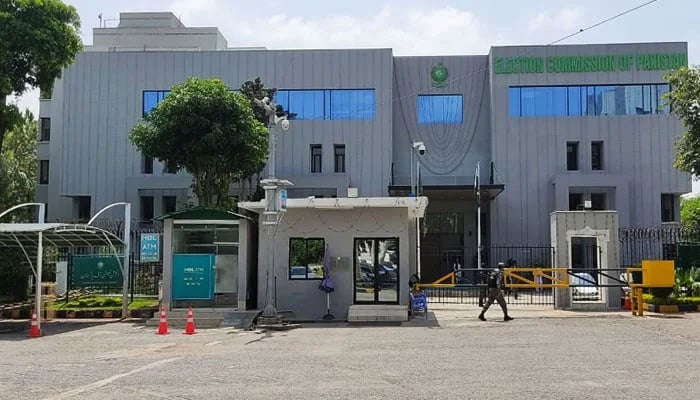Didn’t misinterpret any decision, asserts ECP
Members were of opinion that demand for resignation from Commission was ridiculous
ISLAMABAD: The Election Commission of Pakistan (ECP) made it clear on Friday that it did not misinterpret any decision, announcing that it would implement the Supreme Court (SC) decision on reserved seats for women and minorities.
According to a spokesman, the ECP held meetings for two days on the issue, and decided to implement the SC full court verdict on reserved seats. However, the Commission directed its legal team to point out, if any, the obstacles to implementation of the apex court judgement, so that more guideline could be sought from the top court.
Moreover, it was noted that the chief election commissioner (CEC) and members of the Election Commission were being criticised by a political party continuously. The Commission members rejected the uncalled for criticism. The members were of the opinion that demand for resignation from the Commission was ridiculous. The commission did not care about any kind of pressure and it would continue to work according to the Constitution and the law, the spokesman said.
The Commission said the PTI went to various forums against its decision of not giving it the electoral symbol ‘bat’, but its appeals were rejected and the ECP decision was upheld, as its intra-party elections were not found valid. And, as a logical consequence, the ‘bat’ symbol was withdrawn from the party under Section 215 of the Elections Act. Therefore, he added, blaming the Election Commission was very inappropriate.
Referring to the apex court verdict, the spokesman said 39 MNAs, who had been declared as the MNAs of the PTI, had shown their affiliation with the party in their nomination papers. However, it was necessary for the candidates to submit a party ticket and a declaration to the returning officers (ROs) concerned, which was not done. Therefore, it was not possible for the returning officers to declare them as the PTI candidates. “The other 41 candidates, who had been declared independent, had neither mentioned the PTI in their nomination papers nor did they disclose their affiliation with the party. They also did not submit any party ticket. Therefore, the returning officers allowed them to participate in elections as the independent candidates,” the ECP spokesman clarified. After winning the election, he noted, these MNAs voluntarily joined the Sunni Ittehad Council (SIC) within three days under the law. In the SC, the Sunni Ittehad Council appealed against the ECP decision and the Peshawar High Court verdict, but its appeal was rejected. The PTI was neither a party to the Election Commission proceedings nor it appeared before the Peshawar High Court (PHC) and the Supreme Court.
-
 All You Need To Know Guide To Rosacea
All You Need To Know Guide To Rosacea -
 Princess Diana's Brother 'handed Over' Althorp House To Marion And Her Family
Princess Diana's Brother 'handed Over' Althorp House To Marion And Her Family -
 Trump Mobile T1 Phone Resurfaces With New Specs, Higher Price
Trump Mobile T1 Phone Resurfaces With New Specs, Higher Price -
 Factory Explosion In North China Leaves Eight Dead
Factory Explosion In North China Leaves Eight Dead -
 Blac Chyna Opens Up About Her Kids: ‘Disturb Their Inner Child'
Blac Chyna Opens Up About Her Kids: ‘Disturb Their Inner Child' -
 Winter Olympics 2026: Milan Protestors Rally Against The Games As Environmentally, Economically ‘unsustainable’
Winter Olympics 2026: Milan Protestors Rally Against The Games As Environmentally, Economically ‘unsustainable’ -
 How Long Is The Super Bowl? Average Game Time And Halftime Show Explained
How Long Is The Super Bowl? Average Game Time And Halftime Show Explained -
 Natasha Bure Makes Stunning Confession About Her Marriage To Bradley Steven Perry
Natasha Bure Makes Stunning Confession About Her Marriage To Bradley Steven Perry -
 ChatGPT Caricature Prompts Are Going Viral. Here’s List You Must Try
ChatGPT Caricature Prompts Are Going Viral. Here’s List You Must Try -
 James Pearce Jr. Arrested In Florida After Alleged Domestic Dispute, Falcons Respond
James Pearce Jr. Arrested In Florida After Alleged Domestic Dispute, Falcons Respond -
 Cavaliers Vs Kings: James Harden Shines Late In Cleveland Debut Win
Cavaliers Vs Kings: James Harden Shines Late In Cleveland Debut Win -
 2026 Winter Olympics Snowboarding: Su Yiming Wins Bronze And Completes Medal Set
2026 Winter Olympics Snowboarding: Su Yiming Wins Bronze And Completes Medal Set -
 Trump Hosts Honduran President Nasry Asfura At Mar-a-Lago To Discuss Trade, Security
Trump Hosts Honduran President Nasry Asfura At Mar-a-Lago To Discuss Trade, Security -
 Cuba-Canada Travel Advisory Raises Concerns As Visitor Numbers Decline
Cuba-Canada Travel Advisory Raises Concerns As Visitor Numbers Decline -
 Anthropic Buys 'Super Bowl' Ads To Slam OpenAI’s ChatGPT Ad Strategy
Anthropic Buys 'Super Bowl' Ads To Slam OpenAI’s ChatGPT Ad Strategy -
 Prevent Cancer With These Simple Lifestyle Changes
Prevent Cancer With These Simple Lifestyle Changes




